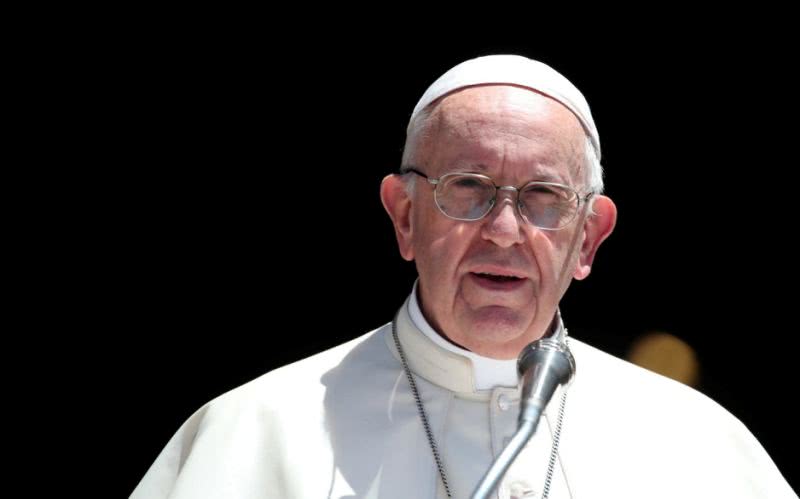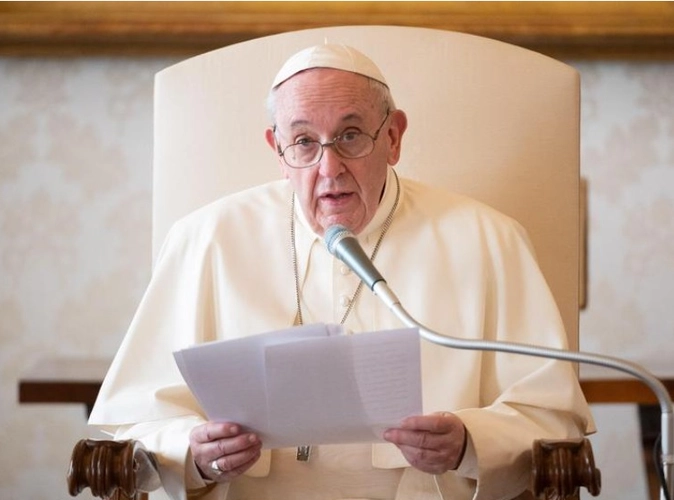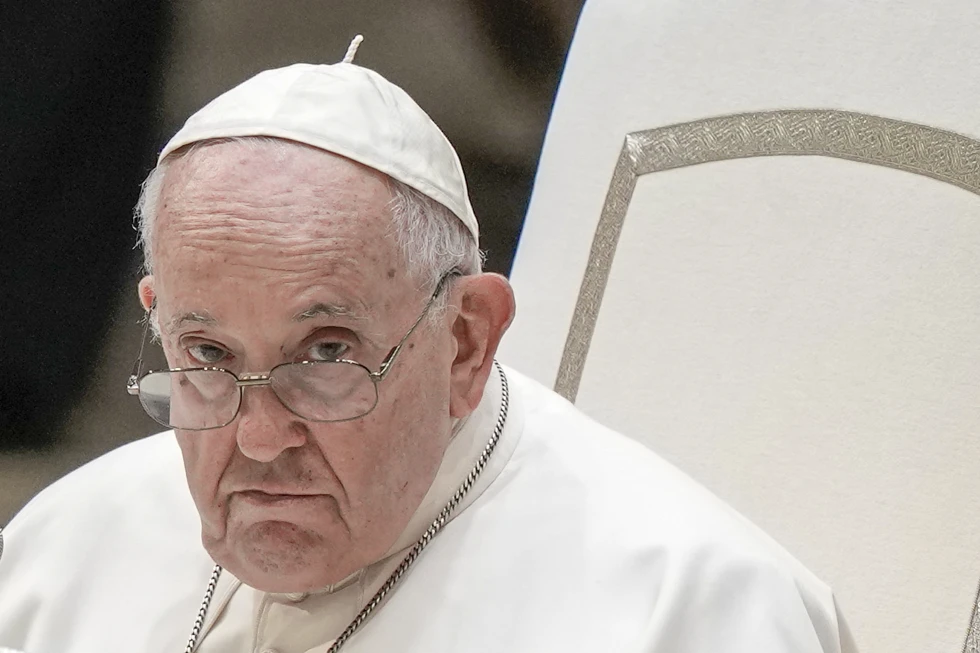In a world marked by increasing threats to peace and human dignity, Pope Francis, in his recent foreign policy address to ambassadors accredited to the Holy See, has brought to the forefront a pressing issue that demands universal attention.
The Pontiff’s impassioned plea for a global ban on surrogate motherhood, which he aptly labeled as “despicable,” underscores the urgent need to address the ethical and moral implications of this practice.
His call for action against the “commercialization” of pregnancy resonates as a crucial step in safeguarding the sanctity of life and upholding the dignity of women and children worldwide.
The year 2024 has dawned amidst a backdrop of escalating global conflicts, humanitarian crises, and environmental challenges, all of which have contributed to the erosion of peace and human rights.
In his address, Pope Francis highlighted the ongoing conflicts in Ukraine and the Middle East, the pressing issue of migration, and the looming specter of climate crises.
Moreover, he underscored the proliferation of nuclear and conventional weapons, labeling their production as “immoral.”
These grave concerns, which threaten the very fabric of human existence, were eloquently articulated by the Pontiff, who emphasized the need for a concerted global effort to address these pressing issues.
In addition to these large-scale threats, Pope Francis also drew attention to smaller-scale issues that pose significant challenges to peace and human dignity.
Foremost among these is the practice of surrogate motherhood, which he unequivocally condemned as a “grave violation of the dignity of the woman and the child.”
His poignant words underscore the moral imperative to protect the unborn and prevent their exploitation as commodities in a commercial transaction.
By denouncing surrogate motherhood as a practice that exploits the material needs of vulnerable women, the Pope has shed light on the inherent ethical dilemmas and human rights violations associated with this controversial practice.
Central to Pope Francis’ stance is the recognition of the inherent value and dignity of every human life. His assertion that a child is a gift and should never be treated as a mere commodity in a commercial contract strikes at the heart of the ethical considerations surrounding surrogate motherhood.
By calling for a universal ban on surrogacy, the Pontiff has issued a clarion call to the international community to take decisive action to prohibit a practice that he views as fundamentally incompatible with the principles of human dignity and justice.
The Pope’s stance on surrogate motherhood is not merely a theological or doctrinal statement; rather, it is a deeply moral and ethical imperative that resonates with the fundamental principles of human rights and social justice.
His call for a global ban on surrogacy is rooted in a profound concern for the well-being of women and children, as well as a commitment to upholding the sanctity of life in all its forms.
By addressing the commercialization of pregnancy and the exploitation of vulnerable women, Pope Francis has underscored the need for a comprehensive and ethical approach to reproductive rights and maternal health.
In conclusion, Pope Francis’ impassioned plea for a universal ban on surrogate motherhood stands as a powerful testament to the moral imperative of safeguarding human dignity and promoting global peace.
His call to action resonates as a poignant reminder of the ethical responsibilities that we bear towards one another as members of a shared humanity.
By addressing the pressing issue of surrogate motherhood, the Pontiff has reaffirmed the timeless values of compassion, justice, and solidarity that are essential for building a more just and humane world.
It is incumbent upon the international community to heed his call and work towards the realization of a world where the dignity of every human life is upheld and respected.
The intersection of Vatican teaching, surrogacy, and geopolitical issues presents a complex and multifaceted landscape that demands careful examination.
This essay delves into the Vatican’s stance on in vitro fertilization, surrogacy, and the broader geopolitical commentary of Pope Francis.

The discussion encompasses the ethical considerations surrounding surrogacy, the global variations in its legality, and the Vatican’s position on this reproductive practice.
Furthermore, this essay scrutinizes Pope Francis’ geopolitical commentary, particularly in relation to Russia’s actions in Ukraine and Israel’s conflict with Gaza.
By exploring these interconnected topics, this essay aims to provide a comprehensive understanding of the Vatican’s teachings and Pope Francis’ geopolitical positions.
The Vatican’s stance on in vitro fertilization and surrogacy is rooted in its doctrinal beliefs, which emphasize the sanctity of life and the dignity of every individual.
Pope Francis has expressed the Roman Catholic Church’s opposition to surrogacy, denouncing it as “uterus for rent.”
This viewpoint aligns with the Vatican’s broader teachings, which emphasize the moral implications of reproductive technologies and their impact on human dignity.
Despite the Vatican’s firm opposition to surrogacy, it has allowed for the baptism of children born to same-sex parents who have resorted to surrogacy.
This nuanced approach reflects the complex ethical considerations that underpin the Vatican’s teachings on reproductive technologies.
The global landscape of surrogacy presents a diverse array of legal frameworks and ethical debates. While commercial surrogacy contracts are prevalent in the United States, offering protections for both mothers and intended parents, they are prohibited in parts of Europe, including Spain and Italy.
The thriving surrogacy industry in Ukraine has come under scrutiny, particularly in the context of the country’s conflict with Russia.
Critics argue that commercial surrogacy targets economically disadvantaged women, exploiting their vulnerability.
In contrast, proponents of surrogacy argue that it provides an opportunity for women to help childless couples while ensuring legal protections for all parties involved.
The ethical complexities surrounding surrogacy necessitate a nuanced and thoughtful approach to its regulation and practice.
In addition to addressing reproductive ethics, Pope Francis has offered geopolitical commentary on significant global events, particularly in relation to Russia’s actions in Ukraine and Israel’s conflict with Gaza.
His public condemnation of Russia’s war in Ukraine marked a departure from his usual diplomatic approach, signaling a more direct and assertive stance.
This shift in tone underscores the gravity of the situation and the Pope’s commitment to speaking out against injustices.
Moreover, his balanced critique of Israel’s military response to Hamas’ assault on southern Israel demonstrates his commitment to impartiality and the pursuit of peace in the region.
Pope Francis’ geopolitical commentary extends beyond specific conflicts, encompassing broader calls for peace and humanitarian action.
His advocacy for an immediate cease-fire in Lebanon, the liberation of hostages in Gaza, and his support for a two-state solution for Israel and the Palestinians underscore the Vatican’s commitment to promoting peace and justice on the global stage.
By addressing these complex geopolitical issues, Pope Francis exemplifies the Vatican’s role as a moral authority and advocate for international harmony.
In conclusion, the Vatican’s teachings on reproductive ethics, particularly its stance on surrogacy, reflect a commitment to upholding the dignity of every individual.
The ethical complexities surrounding surrogacy demand a thoughtful and nuanced approach to its regulation and practice.
Furthermore, Pope Francis’ geopolitical commentary underscores the Vatican’s role as a moral authority and advocate for peace and justice on the global stage.
By examining the intersection of Vatican teaching, surrogacy, and geopolitical issues, this essay has sought to provide a comprehensive analysis of these complex and interconnected topics.
Pope Francis, in his recent address to the United Nations General Assembly, highlighted various humanitarian and refugee crises in Africa, without naming specific countries, and condemned military coups and corrupt elections in the region.
His remarks underscored the urgent need for stability and democratic governance in Africa, as well as the protection of vulnerable populations affected by conflict and displacement.
Furthermore, Pope Francis called for a “respectful diplomatic dialogue” with the Nicaraguan government to address the ongoing crisis in the country.
He expressed concern over the government’s crackdown on the Catholic Church, which has resulted in the detention of numerous priests and bishops.
The Pope’s plea for dialogue reflects his commitment to peaceful conflict resolution and the protection of religious freedom.
In addition, Pope Francis urged for the resumption of Iran nuclear talks, emphasizing the importance of ensuring a safer future for all.
He expressed alarm over the International Atomic Energy Agency’s report that Iran has increased its production of near-weapons-grade uranium, reversing a previous slowdown.
The Pope’s advocacy for nuclear disarmament aligns with his longstanding commitment to peace and the elimination of weapons of mass destruction.
Moreover, Pope Francis condemned the “manufacturing” of nuclear weapons as immoral, in addition to their possession and use.
His strong stance against the weapons industry reflects the Catholic Church’s evolving position on nuclear weapons, as he emphasized the need to recognize the human cost of war and the impact on civilian victims.

By highlighting the individual stories of those affected by conflict, the Pope underscored the moral imperative to prioritize human lives over geopolitical interests.
In conclusion, Pope Francis’s address to the United Nations General Assembly underscored his commitment to promoting peace, dialogue, and the protection of human rights.
His remarks on the crises in Africa, the situation in Nicaragua, and the urgency of nuclear disarmament reflect the moral leadership of the Catholic Church in addressing global challenges.
As the world grapples with complex geopolitical issues, the Pope’s message serves as a reminder of the importance of prioritizing human dignity and the pursuit of a more just and peaceful world.
